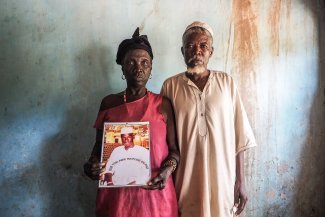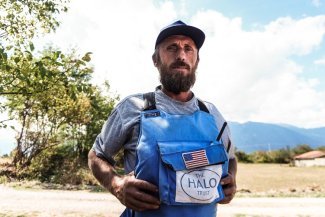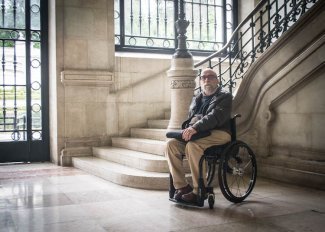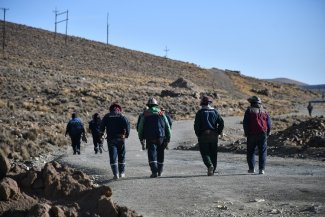Since 2012, roughly two-thirds of Mali’s territory has been gripped by armed conflict. In the country’s north and centre, landmines and improvised explosive devices (IEDs) spread mostly on roads by armed jihadist groups, posing a real danger to the safety of people living in the conflict zone. On its website in March 2022, the United Nations Mine Action Service (UNMAS) called it “a permanent threat to thousands of Malians”. According to the latest figures from UNMAS, 254 IED explosions were reported in the country in 2021. The blasts killed 103 people and injured 297 others, a quarter of whom were civilians.
Many of the survivors have been left without limbs as a result of the blasts. These Malians, who were on military duty or travelling by public transport, had their lives turned upside down in an instant. Once the shock of the accident has passed, the work of rehabilitation must begin.
In Bamako, the Centre Père Bernard Verspieren, a rehabilitation centre run by the Handicap & Réinsertion Mali (HRM) association, offers material and psychological support to victims of explosions. It receives funding from partner organisations including UNICEF and the International Committee of the Red Cross (ICRC) among others. In July 2020, the centre initiated a new programme with the objective of providing around 25 landmine victims with custom-made prostheses every year. These prostheses – which cost an average of 175,000 CFA francs (€260), putting them out of reach of many Malians – are entirely paid for by the Fondation de France, one of HRM’s partners, and are manufactured on-site in dedicated workshops.
Oumar Coulibaly helps the centre to identify the wounded and organise their transport to Bamako. Still an active duty soldier, Oumar was himself the victim of an anti-tank mine in 2012, on the border between Mali and Niger. The only survivor of his team of 11 soldiers, he had to have his leg amputated at the tibia and now benefits from a prosthesis that allows him to continue working for the army administration and the centre. “I assure the victims that life goes on despite the handicap. I lost my leg, but I have my health, a job. Things are going well,” he explains. He tries to give renewed hope to the injured, the prospect of finally returning to a normal life after what can be months of inactivity.

Arouna Traoré, 34, is from the Timbuktu region. He was on a mission with the Malian army when his vehicle hit a mine in 2017. He lost most of his right leg.
Despite his severe amputation, Arouna Traoré had been living without a prosthesis since his accident, mainly due to a lack of information: “I didn’t know what steps to take or how to obtain financial support. It was too expensive for me,” he explains. In January 2022, the Centre Père Bernard Verspieren took over his case. “I’m happy to finally find a way out of this impasse.”

Arouna practises walking with his new prosthetic leg in the Centre Père Bernard Verspieren’s rehabilitation room. It will take him several sessions to get used to his prosthesis.
“This is a new life that’s beginning for me,” said the soldier, following his most recent walking training. After overcoming the difficulties of unfolding his new knee, Arouna is now able to move around on his own, without the help of crutches. His disability may ultimately become invisible to others.

Arouna is currently living in the home of his brother Kati, on the outskirts of Bamako, during follow-up care with the rehabilitation centre.
Although he continues to receive his salary, the accident put an end to Arouna’s activities with the army. Before receiving his prosthetic leg, he walked with the help of a cane but his movements were severely limited. “I stayed home most of the time. Before becoming disabled, I was a very active person. Suddenly I found myself unable to do anything. Naturally, I was discouraged and depressed,” he says. Thanks to his prosthesis, Arouna hopes to be able to return to the army. “Combat is over for me but I can help in other ways. It’s my calling.”

Moulding, design, finishing – the prostheses are directly manufactured at the centre by a team of orthotist/prosthetists.
Treatment at the centre takes less than two months, during which time patients see a number of different specialists, including traumatologists, physiotherapists and psychologists. In addition to physical injuries, accidents can often result in psychological trauma. “Some patients are anxious, stressed or even depressed,” says psychologist Salif Timbiné. “There is also a lot of work to be done on accepting the disability. It entails helping patients to understand that their lives are not over, that they can lead normal lives and reintegrate into society. The challenge is to make the situation less unbearable and to restore hope.”

Dramane Diakité is a 68-year-old former soldier. He was injured in November 2021 in Timbuktu while guiding other soldiers and his leg was amputated below the knee. He now lives with his daughter in Fana while waiting for a prosthesis.
“This accident ruined my life. Everything is difficult now: getting up, moving around, going to bed.” Since his amputation, Dramane Diakité has suffered from both a lack of autonomy as well as from sleep disorders. “The people who died in the accident come to see me in my dreams. They ask me why I’m alive and they’re not.” He has high hopes for his future prosthesis.

Measurements are taken for Assa Kabara, who was injured in a mine explosion while travelling by bus to the capital. A cleaner by profession, she has not been able to work since the accident in January 2021. “I stay at home all day doing nothing.”
Assa Kabara was hit by a landmine not far from her home in Gao while on a bus heading to Bamako. Only ten of the 30 passengers survived. “Everyone I know is afraid of hitting a mine whenever they travel. It can happen to anyone, at any time.” But her disability has not dampened her optimism: “Healing is also in the mind. If it’s not right morally, you won’t make it. God did this, so it’s going to be okay.” Today, she is looking forward to getting her life back on track.

Arouna and physiotherapist Arnaud Azouma (right), who chose his profession above all for its social impact: “I like being in contact with people. I’m here to improve their quality of life. Mine victims have suffered a major shock. I give them a boost and motivate them.” The boost he provides can prove vital to his patients as they prepare to face future challenges.
In Mali, few people with disabilities are entitled to social assistance from the state. Workers who suddenly find themselves unable to carry out their professions can claim a disability pension, as is the case for military personnel. Those like Assa, who work informal odd jobs, are often left without resources.
According to Handicap International’s website: “People with disabilities are excluded and often victims of discrimination or prejudice; they represent the largest minority in the country. They have little or no access to healthcare, education, social services or employment. A very small proportion of children with disabilities attend school. In times of crisis, poor people find themselves in a situation of increased vulnerability.”















